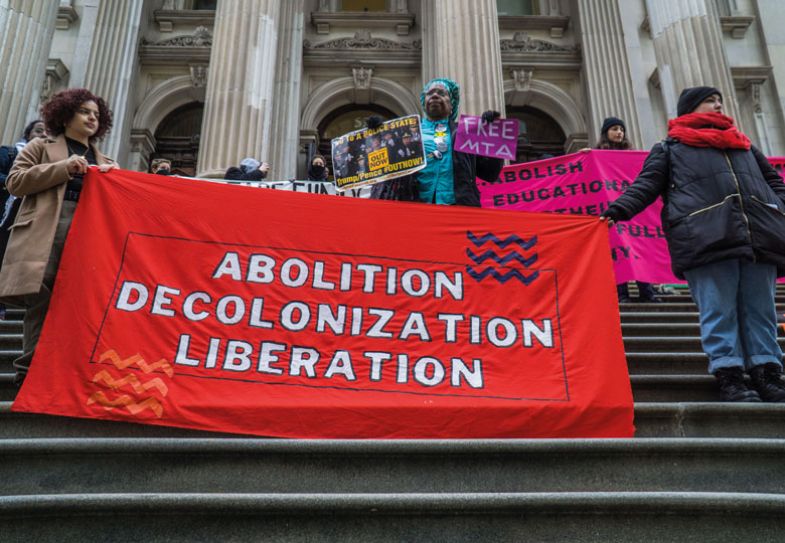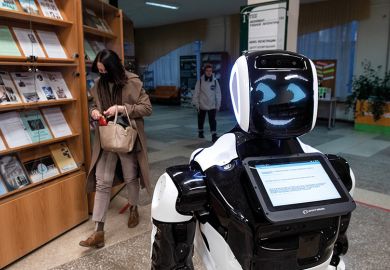There is something startling about a black scholar publishing a book titled Against Decolonisation.
In Times Higher Education’s 2020 survey of attitudes to decolonisation, 71 per cent of respondents agreed that “decolonisation of the curriculum is important in higher education”, 52 per cent of them strongly. Furthermore, those who described their race as other than white were even more likely to agree (81 per cent).
So Olúfẹ́mi Táíwò, the Nigerian-born professor of African political thought at Cornell University, is something of an outlier when he dismisses the “whole decolonisation movement” as “a cult”. It is, he claims, “the latest fever of the American mind”, which “has broken or is about to break, because more and more of the excesses are becoming clear”.
In Western universities, calls for decolonisation tend to include demands not only that reading lists incorporate a much wider variety of voices – notably including those from Africa, India and the Caribbean – but also that courses examine the ways certain disciplines were deeply shaped by colonialism, as well as address head-on the racism of many canonical Western thinkers. So is this what Táíwò means by “decolonisation”, or has a rather different understanding of it led him to devote a whole book to setting out why he is against it?
Táíwò’s rejection of the agenda lies in his vigorous defence of modernity and his desire to correct myths about its arrival in Africa. Shortly after moving to Cornell from Seattle University, whose African studies programme he co-founded, he published Africa Must Be Modern: A Manifesto (2014), which his new book describes as “a no-holds-barred, full-throated defence of ‘modernity’ and why it offers Africa the most promising path for getting out of the ‘misery corner’ of the globe”.
Asked how he defines “modernity” in this context, Táíwò points to “a set of ideas, processes and practices that are associated with what we call the Renaissance in Europe”. These notably include individualism, the belief in the centrality of reason (which underlay the scientific revolution) and the idea of progress. It has been argued by Africans that such “modernity” was introduced into their continent by colonialism, he points out, leading to its association with Westernism and “whiteness”.
Táíwò takes a different view. “Modernity was not brought to West Africa by colonialists, but by Christianity,” he explains to Times Higher Education. “In the early part of the 19th century, a new wave of evangelisation went to West Africa from Europe and the Americas, and the people who led that movement were themselves African returnees…That was the original transition to modernity.”
Colonialism, by contrast, “was not interested in Africans embracing modernity”; rather, it “subverted modernity in Africa”.
If colonisation held back Africa’s modernisation, it might seem counter-intuitive to write a book decrying today’s decolonisation efforts. But Táíwò’s latest tome, Against Decolonisation: Taking African Agency Seriously (published recently by Hurst), explains that the current push risks throwing the baby out with the bathwater. The book’s main target is scholars it accuses of extending the notion of “decolonisation” well beyond its basic sense – “making a colony into a self-governing entity” – into something much broader, namely “forcing an ex-colony to forswear…any and every cultural, political, intellectual, social and linguistic artefact, idea, process, institution and practice that retains even the slightest whiff of the colonial past”.
Such calls may enable these scholars to “perform contemporary ‘morality’ or ‘authenticity’”, but their nebulous goals, in Táíwò’s view, are both intellectually incoherent and dangerous.
Instead of obsessing over whether a particular idea or institution is “authentically African” or imported from outside, he wants readers to consider whether or not it is valuable today. For instance, the book notes that Africans have often embraced “modern forms of government dominated by liberal representative democracy” and have shown little appetite for the return of “chiefly rule”. States have also chosen to retain and defend borders established in colonial times. And while it might sound attractive when pundits argue that African education should be carried out in precolonial languages, this ignores the immense practical difficulties involved. The huge challenges the continent faces will never be addressed through vague talk about “traditional thought”, “African modes of governance” and “the static idea of ‘precolonial Africa’”, Táíwò argues in the book.

Above all, if a former colony still retains ideals or institutions introduced by an imperial power six decades after independence, he writes, we should not just “rush to decolonise it as a colonial hangover or product”, but acknowledge that it has been retained, for better or for worse, through “inertia or a choice by the peoples or intellectuals” of the country. Anything else means refusing to “take African agency seriously”.
Although he has now worked in the US for more than three decades and is reluctant to offer detailed comments on the state of African higher education, Táíwò believes that “the decolonisation trope” is “practically endangering the future of scholarship” in the continent: “To the extent that people equate science with a ‘Western’ contraption or colonial inheritance, one can only imagine the culs-de-sac awaiting those who wish to reinvent or recover an ‘African’ science motivated by identitarian commitments.”
Because his scholarly work is centred on Africa, Táíwò naturally gives pride of place to calls for decolonisation in that context. But he does not see the debate about decolonising Western curricula as separate. “Decolonising the curriculum is a strand of the much larger movement about decolonising everything. I focus on Africa because that is my constituency and that is where I feel the damage is being done at a very serious level. But the same strictures would apply to people who say, for instance, that we should decolonise philosophy.”
Given that “human beings borrow from one another all the time”, and that a liberal education needs to teach students about “the depth, breadth and complexity of the human experience”, Táíwò is very committed to the general idea of widening the curriculum well beyond the traditional Western canon. Way back in 1993, he published a paper titled “On Diversifying the Philosophy Curriculum”, which examined “the role philosophy played in slavery”, “the role that ex-slaves such as Frederick Douglass played in expanding the bounds of freedom in liberal democracies” and “the role that ex-colonials played in India and Africa in forcing colonial authorities” to live up to their professed ideals.
What are far less valuable, as Táíwò sees it, are broader articles on “philosophy in precolonial Africa”, which seek to cover the whole continent, from the beginning of time to the age of imperialism. Analyses of “Yorùbá practices, rituals and philosophical nuggets” in 19th-century Nigeria, for example, need to take account of their specific historical context, “unless you want to say the Yorùbá are the way they were at the beginning of time. That would be stupid!”
The danger of the decolonising approach, Táíwò adds, is that “it shuts younger people out of an interest in the genealogy of ideas. They have their favourite people that they need to know and others whose sins make them unworthy of study. How do you create good scholarship out of that kind of thing?”
So how would he deal with canonical Western thinkers whose ideas on race now strike most people as disgusting?
“I tell my students that there’s a reason we read [Immanuel] Kant and not Hitler,” Táíwò replies. “We do not paper over Kant’s racism – we should teach the racism as part of Kant when we are reading Kant…The record must be complete, but how we decide who we continue reading will ultimately go back to the ideal of liberal education: what do they have to tell us about making sense of the human condition and how we might, looking at all the alternatives, create a better world for everybody? Kant belongs there. Hitler doesn’t. It is not because they are not both racists; it’s because Hitler has no content but Kant does.”
Something similar applies to disciplines such as anthropology, whose origins are widely acknowledged to be tainted by colonialism and racism. Táíwò has little time, he writes, for the scholars who “hyperventilate about, apologise for and are scrambling to distance the discipline from its colonial roots”. Far more rewarding is to look at what has actually been built on these faulty foundations: “Some of the best [African anthropologists] have turned this field of study to making sense of their own reality, away from the gaze of disciplinary gatekeepers in cultural anthropology and urban anthropology.”
Both in Africa and far beyond, academics, disciplines, universities and nations are being urged to face up to their dark histories and to decolonise many aspects of the ways they operate. Táíwò is an urgent and eloquent voice in suggesting that they need to think harder about whether and how that should be done.
Register to continue
Why register?
- Registration is free and only takes a moment
- Once registered, you can read 3 articles a month
- Sign up for our newsletter
Subscribe
Or subscribe for unlimited access to:
- Unlimited access to news, views, insights & reviews
- Digital editions
- Digital access to THE’s university and college rankings analysis
Already registered or a current subscriber?








